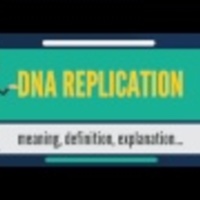DNA Replication
Dublin Core
Title
Subject
Description
In molecular biology, DNA replication is the biological process of producing two identical replicas of DNA from one original DNA molecule. This process occurs in all living organisms and is the basis for biological inheritance. DNA is made up of a double helix of two complementary strands. During replication, these strands are separated. Each strand of the original DNA molecule then serves as a template for the production of its counterpart, a process referred to as semiconservative replication. Cellular proofreading and error-checking mechanisms ensure near perfect fidelity for DNA replication.
In a cell, DNA replication begins at specific locations, or origins of replication, in the genome. Unwinding of DNA at the origin and synthesis of new strands results in replication forks growing bi-directionally from the origin. A number of proteins are associated with the replication fork to help in the initiation and continuation of DNA synthesis. Most prominently, DNA polymerase synthesizes the new strands by adding nucleotides that complement each (template) strand. DNA replication occurs during the S-stage of interphase.
DNA replication can also be performed in vitro (artificially, outside a cell). DNA polymerases isolated from cells and artificial DNA primers can be used to initiate DNA synthesis at known sequences in a template DNA molecule. The polymerase chain reaction (PCR), a common laboratory technique, cyclically applies such artificial synthesis to amplify a specific target DNA fragment from a pool of DNA.
Input by : Rahmah Agustira
In a cell, DNA replication begins at specific locations, or origins of replication, in the genome. Unwinding of DNA at the origin and synthesis of new strands results in replication forks growing bi-directionally from the origin. A number of proteins are associated with the replication fork to help in the initiation and continuation of DNA synthesis. Most prominently, DNA polymerase synthesizes the new strands by adding nucleotides that complement each (template) strand. DNA replication occurs during the S-stage of interphase.
DNA replication can also be performed in vitro (artificially, outside a cell). DNA polymerases isolated from cells and artificial DNA primers can be used to initiate DNA synthesis at known sequences in a template DNA molecule. The polymerase chain reaction (PCR), a common laboratory technique, cyclically applies such artificial synthesis to amplify a specific target DNA fragment from a pool of DNA.
Input by : Rahmah Agustira
Source
http://youtu.be/zUhgh8qG4j8
Publisher
Date
2016-11-27T19:21:40.000Z
Contributor
Rahmah Agustira
Rights
Creative Commons License
This video represents licensed content on YouTube, meaning that the content has been claimed by a YouTube content partner.
This video represents licensed content on YouTube, meaning that the content has been claimed by a YouTube content partner.
Moving Image Item Type Metadata
Imported Thumbnail
https://i.ytimg.com/vi/zUhgh8qG4j8/default.jpg
Files
Collection
Citation
“DNA Replication ,” Open Educational Resources (OER) , accessed January 27, 2026, http://oer.uinsyahada.ac.id/items/show/38.


